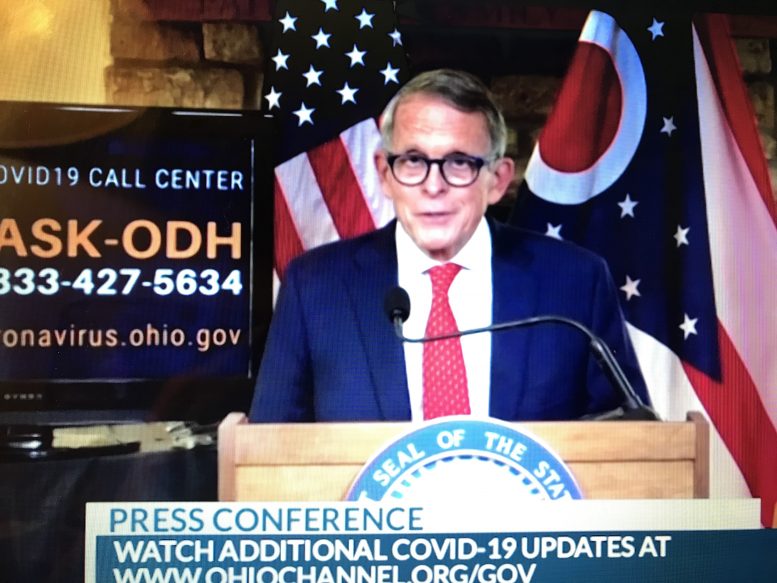Ohio Gov. Mike DeWine on Tuesday listed the parts of the Affordable Care Act that he said Americans had come to a consensus in support of.
He mentioned the rule requiring insurers to provide health coverage regardless of preexisting conditions. He also listed parents’ ability to keep their children on their insurance until the kids turn 26.
But he didn’t address what the question was principally about: The more than half-million low-income Ohio who might lose their health care in the middle of a pandemic if the nominee DeWine is supporting for the U.S. Supreme Court votes to overturn the Affordable Care Act.
The governor’s unwillingness to speak up for the part of the ACA that expands Medicaid eligibility to Ohioans earning up to 138% of the federal poverty level seems a little perplexing. His administration is embarked on a major reform of the state’s $27 billion Medicaid system with “A vision of what we hope will be a better, healthier, more productive state of Ohio,” DeWine said recently.
And his sympathies seem to be with Ohioans who tend to be eligible for coverage under the Medicaid expansion. On Tuesday as he again urged people to mask up, DeWine spoke up for the sort of low-income service workers who are among the most vulnerable to coronavirus.
“If somebody’s stocking shelves (in a grocery store) and they have a mask on and you don’t, it’s not fair,” he said during a press conference.
But DeWine won’t speak up for a Medicaid expansion that was providing coverage for 525,000 Ohioans before the pandemic took hold.
He had been against the entire ACA until beginning his 2018 gubernatorial run in the midst of an opioid crisis during which the Medicaid expansion made treatment available to many Ohioans. Then he said he wouldn’t opt out of the expansion, which is voluntary for states.
But when DeWine’s press secretary was asked last week whether the governor wanted to see the expansion protected, he said only that eligibility is determined by the federal government and that “Governor DeWine has kept Medicaid expansion during his tenure.”
The matter is of some relevance right now because nomination hearings are being fast-tracked to put Judge Amy Coney Barrett on the U.S. Supreme Court by Election Day. If that happens, the conservative jurist will hear oral arguments on Nov. 10 in the latest attempt by prominent Republicans to strike down the law.
DeWine on Tuesday again sang Barrett’s praises.
“Judge Barrett, I believe, is a stellar, stellar candidate… She’s eminently qualified, has a great background and I think she’ll be a great justice.”
If she’s confirmed — as seems likely — she could be the swing vote against the ACA. Barrett in the past has criticized Chief Justice John Roberts’ reasoning in an earlier decision that mostly upheld Obamacare.
That’s not certain, however. The most recent case, Texas v California, is said by some observers to be more of a stretch than earlier challenges to the health care law.
But when DeWine was asked Tuesday if he was concerned that 500,000 low-income Ohioans could lose health care in a repeal that would also cost protections for those with preexisting conditions, he addressed the latter and not the former.
“I think there’s a real consensus in this country and among members of Congress, governors, that preexisting has to be covered… keeping insurance until your child is 26 has to be covered,” he said. “There are other things that have to be covered.”
***
Also from Ohio Capital Journal:
With CARES Act funding drying up, Ohio joins nation in finding new sources of child care support
While child care centers are still in need of support to make it through the pandemic, Ohio was not alone in having to find more money beyond federal dollars amid the COVID-19 pandemic.
Ohio’s methods of subsidizing struggling child care facilities were part of a national study done by the non-profit think tank Bipartisan Policy Center, in looking at the diminishing CARES Act funds for the child care industry.
At the end of March, the federal CARES Act provided support for the child care system throughout the country, including $3.5 billion in appropriations for the Child Care and Development Block Grant.
That block grant gave Ohio $117 million, used by the state to pay emergency child care providers staying open for frontline workers, according to the study. The state reduced the size of child care groups and focused on state-licensed child care centers first and foremost.
The state used some of the CARES Act funding to offer monthly grants to cover health and safety and payroll costs during those periods of low attendance. Those grants lasted through August. READ MORE
Gahanna-Jefferson teachers union strikes over school COVID-19 plans
GAHANNA — A Franklin County teachers union voted to strike Tuesday in protest of the Gahanna-Jefferson Public School District’s hybrid learning model, created as a response to the COVID-19 pandemic.
At Gahanna-Lincoln High School, members of the Gahanna-Jefferson Education Association formed a picket line along Hamilton Road, waving signs calling for “safety” and “equity” for students. About 572 teachers are in the GJEA, per a union spokeswoman.
In interviews, teachers said the district’s current hybrid education plan puts them in a pinch; They have to teach classes to the “blue” students who take in-person classes Wednesday and Friday, the “gold” students” who take classes Tuesday and Thursday, and online-only students as well.
Teachers said the online-only learning is essentially just a camera in the back of the hybrid classrooms livestreaming the lessons. Along with leading the in-person class, teachers are expected to work with the online-only students through webcams and a chatroom. READ MORE





